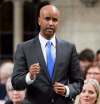Minister in Winnipeg, seeks input on migrants
Advertisement
Read this article for free:
or
Already have an account? Log in here »
To continue reading, please subscribe:
Monthly Digital Subscription
$1 per week for 24 weeks*
- Enjoy unlimited reading on winnipegfreepress.com
- Read the E-Edition, our digital replica newspaper
- Access News Break, our award-winning app
- Play interactive puzzles
*Billed as $4.00 plus GST every four weeks. After 24 weeks, price increases to the regular rate of $19.95 plus GST every four weeks. Offer available to new and qualified returning subscribers only. Cancel any time.
Monthly Digital Subscription
$4.99/week*
- Enjoy unlimited reading on winnipegfreepress.com
- Read the E-Edition, our digital replica newspaper
- Access News Break, our award-winning app
- Play interactive puzzles
*Billed as $19.95 plus GST every four weeks. Cancel any time.
To continue reading, please subscribe:
Add Free Press access to your Brandon Sun subscription for only an additional
$1 for the first 4 weeks*
*Your next subscription payment will increase by $1.00 and you will be charged $16.99 plus GST for four weeks. After four weeks, your payment will increase to $23.99 plus GST every four weeks.
Read unlimited articles for free today:
or
Already have an account? Log in here »
Hey there, time traveller!
This article was published 03/08/2017 (3095 days ago), so information in it may no longer be current.
Canada’s immigration minister is in Winnipeg to consult with local resettlement groups before deciding how many and what sort of newcomers to welcome next year.
Immigration, Refugees and Citizenship Minister Ahmed Hussen has no plans to speak to the media, but one of the Winnipeggers Hussen is sitting down with told the Free Press what he hopes to impress upon the minister.
“It’s important for us to make sure that humanitarian immigration is a strong part of Canada’s immigration,” said Brian Dyck, the Mennonite Central Committee’s national migration and resettlement program co-ordinator.
“It’s important to get the balance right with various aspects of humanitarian immigration and make sure they’re well supported,” said Dyck, who also chairs the National Refugee Sponsorship Agreement Holder Association that meets with the Canadian government to help form policy on refugee resettlement.
Lately, Dyck has been involved with the Global Refugee Sponsorship Initiative, advising groups and governments in the United Kingdom, where they’ve set up a private refugee sponsorship program similar to Canada’s.
“Canada is in a position to be looked at as a leader globally in terms of refugee resettlement,” said Dyck, who has travelled to the U.K. twice this year to talk about private refugee sponsorship. One of the U.K.’s first sponsors was the Archbishop of Canterbury, who had a Syrian family move into his official London residence, Lambeth Palace. Canada’s private sponsorship program is such a success because it’s not just one person or small group taking the refugees under their wing, Dyck told the Brits.
“One of the things we highlighted that Canada has — and that was appealing to them — is that it’s not just a few people involved in doing this. It’s everyone — a large group is making sure these people feel that they’re integrated. That’s one of the successes — it’s all of our responsibility.”
Hearing the NGOs in the U.K. excited about refugee resettlement as a way to build and energize their communities and make a difference personally was encouraging, Dyck said. Their reaction was in stark contrast to the result of last year’s Brexit vote that was seen as rejection of newcomers to the U.K.
“This is one way people can demonstrate, ‘That’s not who we are,’” said Dyck, who met with sponsors, politicians and government representatives in places like Bristol and Manchester.
Sponsors in the U.K. face challenges similar to their Canadian counterparts, including access to affordable housing and how to get the most bang for your buck with integration programs.
“They were asking questions about the effectiveness of the settlement services Canada,” Dyck said Wednesday on the eve of his meeting with Canada’s immigration minister. “Service standards are something this government is focused on — not just for refugees, but for all who can access settlement services.”
He said the federal government has said it wants immigration policy to be driven by data and to know what is working and if money is being well spent.
“Are they improving their French or English? Are they learning skills so they can get good jobs?” — they’re the kinds of questions many refugee-welcoming countries are asking as the world witnesses the greatest number of displaced people since the Second World War. Dyck thinks they’ll find the answers.
“It is an exciting time, not just in Canada but globally. Some people are looking at this as an opportunity to be creative in ways to deal with forced displacement.”
carol.sanders@freepress.mb.ca

Carol Sanders
Legislature reporter
Carol Sanders is a reporter at the Free Press legislature bureau. The former general assignment reporter and copy editor joined the paper in 1997. Read more about Carol.
Every piece of reporting Carol produces is reviewed by an editing team before it is posted online or published in print — part of the Free Press‘s tradition, since 1872, of producing reliable independent journalism. Read more about Free Press’s history and mandate, and learn how our newsroom operates.
Our newsroom depends on a growing audience of readers to power our journalism. If you are not a paid reader, please consider becoming a subscriber.
Our newsroom depends on its audience of readers to power our journalism. Thank you for your support.


